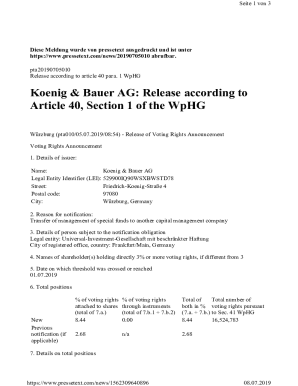The Extreme Cost Of Broadcom's VMware Deal: AT&T Reports 1,050% Price Surge

Table of Contents
AT&T's 1050% VMware Price Hike: A Case Study
AT&T's experience serves as a stark warning regarding the post-acquisition pricing strategies employed by Broadcom. The reported 1050% increase in VMware licensing costs represents a significant financial blow and a case study in the potential risks associated with the Broadcom VMware deal.
The Details of the Price Increase:
While the exact details of AT&T's contracts and pricing before and after the acquisition remain confidential, the sheer magnitude of the increase – a tenfold jump – is alarming. This suggests that the price hike wasn't a minor adjustment, but a substantial restructuring of VMware's licensing fees. Reports indicate that the increase affected a range of VMware products, impacting AT&T's overall IT infrastructure and operational costs.
- Specific increases varied depending on the VMware product and licensing model. Some reports suggest that essential virtualization tools saw particularly steep price increases.
- AT&T has not publicly commented on the specific details of their price increase, citing contractual confidentiality. However, the sheer scale of the reported increase speaks volumes.
- Comparing this increase to other reported increases from other companies is difficult due to a lack of transparency. However, numerous anecdotal reports suggest that many organizations are facing significant price hikes following the Broadcom acquisition.
- The impact on AT&T's budget is likely substantial, requiring significant reallocation of resources and potentially impacting future IT planning and innovation initiatives. This unexpected cost increase forces a reassessment of their IT strategy and budget allocations.
Broadcom's Business Strategy and Potential Anti-Competitive Practices
The dramatic price increases following the Broadcom VMware deal have raised significant concerns about Broadcom's post-acquisition business strategy and potential anti-competitive practices.
Analyzing Broadcom's Post-Acquisition Pricing:
The rationale behind these steep price hikes is likely multi-faceted. Consolidating market power allows Broadcom to leverage its dominant position to extract higher profit margins from its VMware customer base. This aggressive pricing strategy, however, risks alienating existing customers and potentially stifling innovation within the broader enterprise software market.
- Broadcom has a history of acquisitions followed by price increases. Examining past acquisitions reveals a pattern of consolidation and subsequent cost adjustments.
- Antitrust concerns and regulatory investigations are already underway in several jurisdictions. Concerns about monopolistic practices and the impact on competition are central to these investigations.
- The impact on competition within the virtualization and enterprise software market is significant. The increased cost of VMware products could make it difficult for smaller companies to compete, potentially leading to market consolidation.
- Expert opinions and analyst reports suggest a growing concern over Broadcom's pricing strategies and their potential to harm innovation and consumer choice.
The Broader Impact on the Enterprise Software Market
The Broadcom VMware deal's impact extends far beyond AT&T. The ripple effects are felt across various industries, impacting businesses that rely on VMware's virtualization solutions.
Ripple Effects Across Industries:
Many organizations are facing similar VMware price increases, raising significant concerns about the long-term sustainability and affordability of enterprise software. This situation creates uncertainty for businesses and necessitates a careful review of their IT infrastructure and spending habits.
- Businesses of all sizes are likely to encounter similar price increases, although the specific impact will vary based on their individual contract terms and usage.
- The potential impact on innovation is substantial. Higher prices may discourage experimentation with new technologies and slow down the development of innovative solutions. The increased cost could stifle competition and lead to a less dynamic market.
- Enterprise software spending patterns are expected to shift. Companies may explore alternative solutions, including open-source options and products from competing vendors, to reduce their reliance on VMware.
- Potential legal challenges and class-action lawsuits are emerging, reflecting the widespread dissatisfaction with Broadcom's post-acquisition pricing practices.
Mitigation Strategies for Businesses Facing VMware Price Increases
Facing a potential 1050% increase in VMware costs is daunting, but businesses can take proactive steps to mitigate the impact.
Options for Cost Reduction and Vendor Diversification:
Understanding the potential for price increases related to the Broadcom VMware deal is crucial for effective budget planning. Proactive mitigation strategies are vital.
- Exploring alternatives to VMware's virtualization solutions is crucial. Open-source options like Proxmox and oVirt, as well as products from competitors like Citrix and Microsoft, offer viable alternatives.
- Negotiating better contracts with Broadcom is essential. Aggressively negotiating contract terms and licensing agreements can help limit cost increases.
- Optimizing VMware licensing and usage can significantly reduce costs. Careful analysis of current licensing agreements and usage patterns can identify areas for improvement and cost savings.
- Long-term planning to minimize future price shocks involves diversifying your IT infrastructure and adopting a more flexible approach to software licensing and procurement.
Conclusion
The extreme cost of Broadcom's VMware deal is undeniable, as evidenced by AT&T's dramatic 1050% price surge. This case highlights the broader implications for the enterprise software market, imposing significant financial burdens on businesses. The potential for anti-competitive practices and the ripple effects across industries necessitate a cautious and proactive approach. Businesses relying on VMware must carefully analyze their current contracts and spending, understanding the potential for drastic price increases. Proactive mitigation strategies, including exploring alternatives, negotiating contracts, and optimizing licensing, are essential to minimize the impact of the Broadcom VMware price surge. Don't wait until you face a massive increase; plan for the future of your VMware licensing costs today.

Featured Posts
-
 Offenlegungspflicht Pne Ag Artikel 40 Absatz 1 Wp Hg
Apr 27, 2025
Offenlegungspflicht Pne Ag Artikel 40 Absatz 1 Wp Hg
Apr 27, 2025 -
 German Renewable Energy Expansion Pne Group Receives Permits For Wind And Solar Projects
Apr 27, 2025
German Renewable Energy Expansion Pne Group Receives Permits For Wind And Solar Projects
Apr 27, 2025 -
 Celebrity Transformation Ariana Grandes New Hair And Tattoos
Apr 27, 2025
Celebrity Transformation Ariana Grandes New Hair And Tattoos
Apr 27, 2025 -
 Tesla Raises Canadian Prices Impact Of Tariff Policy On Inventory
Apr 27, 2025
Tesla Raises Canadian Prices Impact Of Tariff Policy On Inventory
Apr 27, 2025 -
 Open Ai Simplifies Voice Assistant Development
Apr 27, 2025
Open Ai Simplifies Voice Assistant Development
Apr 27, 2025
